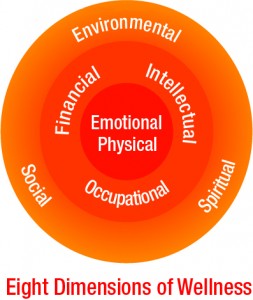Our Wellness Philosophy
Wellness is a multifaceted approach to living that promotes being well in all areas of life.
It is more than just the absence of disease or illness. Being well requires active engagement, making the choices that support wellness. Wellness is unique to each individual and involves a dynamic process that changes with every new experience. At BHWP, we believe that in order for healthcare professionals and community leaders to promote wellness, they need to engage in their own process of health behavior change as well as advocate wellness for those with whom they work.
 |
We believe it is important to work across all 8 dimensions of wellness. This approach addresses the whole person by acknowledging that a lack of health or well-being in one area of a person’s life affects their overall sense of well-being. When you open multiple doors to wellness, you can create personal and organizational momentum that translates into sustained health behavior change. Since the most prominent, preventable causes of death and disability relate to tobacco use and obesity, our program strongly emphasizes tobacco control as well as weight management and nutrition initiatives.
Emotional Wellness involves awareness of your emotions as they occur, expressing and processing your emotions in a productive and positive way, using the insight provided by your emotions to guide your actions, approaching life with optimism, creating interdependent relationships that involve trust and respect, and engaging in healthy coping mechanisms.
Environmental Wellness involves living and working in environments that are safe and healthy and facilitate your sense of well-being. Since our environments have a big impact on how we feel, it is important for your environment to be pleasing to you, free from exposure to toxins and in balance with the broader natural environment.
Financial Wellness involves accessing your financial resources and knowledge to direct financial decisions and planning. It means knowing how your investments are distributed and whether this is in alignment with your personal values and desires.
Intellectual Wellness involves engaging in mentally stimulating activities, creativity, and expanding your personal and professional knowledge and skills. Intellectual wellness also encompasses involvement in the exploration of new ideas and information.
Occupational Wellness involves finding personal satisfaction and fulfillment through work. It entails using your talents and skills to their fullest extent through your career as well as understanding the need for and creating a balance between work and personal time.
Physical Wellness includes being aware of and taking care of your body, including engaging in pleasurable physical activity and eating food that is nutritious. Physical wellness also involves obtaining regular medical check-ups, sleeping well, and living tobacco-free.
Social Wellness involves creating meaningful interpersonal relationships that feel supportive and satisfying. Social wellness also involves contributing positively to one’s community.
Spiritual Wellness involves having a belief system that is meaningful and matches your values, establishing a life that feels purposeful, and being compassionate towards others. Spiritual wellness does not necessarily mean having a religion; rather, it focuses on your ability to attribute meaning to life and the day-to-day interactions you experience.
